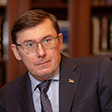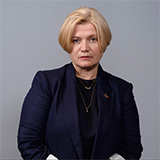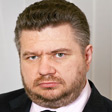18 травня 2012, 21:28
Українські дипломати в дії

Ukrainian hardball irks, puzzles at trade body
Reuters, Fri May 18, 2012
By Tom Miles
GENEVA May 18 (Reuters) – Laos, a small nation dependent on aid and rice farming, wants to join the World Trade Organization. WTO powers including the United States, China and the European Union want it to.
But it can't, because Ukraine – and only Ukraine – half a world away and with no trade to speak of with Laos, says 'No'.
It is also alone of the 155 members of the world trade body in keeping out Yemen, whose Western-backed government, a product of the Arab Spring, wants international help to stabilise a nation beset by poverty, conflict and an al Qaeda insurgency.
Frustrating Laos and Yemen, both of whom have spent over a decade negotiating membership, is part of a pattern of single-handed consensus-busting that diplomats from major blocs say is turning Ukraine, second biggest of the former Soviet states, into the new "bad boy" of the Geneva-based global trading club.
For a nation that hopes to seal its emergence from Russia's shadow into a closer embrace with the European Union by co-hosting next month's Euro 2012 soccer tournament, Ukraine would not win many diplomatic popularity contests; EU states complain of graft and rights abuses and this week froze a cooperation pact due to its jailing of opposition leader Yulia Tymoshenko.
Now, at WTO headquarters in Geneva, Ukrainian diplomats are seen as pursuing a policy that looks like bullying, though their explanations leave many speculating on other motives – ranging from bloody-minded revenge for Kiev's own rocky journey to membership to treating Laos and Yemen as mere bargaining chips in a wider strategy of diplomatic reward and retribution.
Among other puzzles, Ukraine has asked the WTO to block an Australian anti-smoking measure that bans branding on cigarette packets – though it exports little tobacco itself to Australia.
EXPORT AMBITIONS
"Petty", "predatory" and "pernicious" are just a few of the adjectives attached to Ukraine by diplomats in Geneva, not to mention "pain in the ass". As one negotiator put it: "For these guys, the idea of 'soft power' is just nonsense."
But Ukrainian trade negotiator Valery Pyatnytsky insists that he is merely promoting fair trade. His country attached "paramount importance", he said, to finding compromises and completing talks with the two aspirant WTO members – both of which could hope to join the body this year, if Ukraine relents. But Kiev would resist outside pressure to cut a deal, he added.
"The completion of negotiations with other... members cannot impose any obligation or imperative requirement to immediately end the process of bilateral negotiations," he said in emailed replies to Reuters. For a country to accede to the trading club, all existing members must agree, giving Ukraine a veto.
Pyatnytsky said his country was trying to guarantee its current and future economic interest by asking the candidates to cut tariffs on imports in the farming and metals sectors:
"Ukraine's metals industry is interested in exporting to Yemen and Laos, which will help develop infrastructure and to modernise industry in these countries," he said.
In theory, opening pathways for exports would help Ukraine reduce its trade deficit, which more than doubled last year to $6.7 billion. But in practice, Laos and Yemen are insignificant markets. State Statistics Service data show $17 million of Ukrainian goods went to Yemen in 2011, or 0.02 percent of total Ukrainian exports. Laos bought $48,700 of Ukrainian produce.
One trade expert involved in WTO negotiations said Ukraine was demanding more access for steel and cement. But it could not hope to benefit from such a concession from Yemen and Laos, since the terms would apply to all their trading partners.
"There's no way they can deliver cement to Laos that's competitive with China," he said. "The ones who would profit would be all the other exporters except Ukraine."
"INFERIORITY COMPLEX"
Some trade diplomats suggest Ukraine is simply pressurising new entrants because its own journey to WTO membership was a rough ride, and it feels others should get the same treatment.
While that seems a bizarre basis for policy, some Ukrainians say it is not out of character for President Viktor Yanukovich.
Taras Kuzio, a critic of the government and a Ukraine expert at the School of Advanced International Studies at John Hopkins University, said: "I think it's the political culture of people in power. They feel aggrieved because they took a long time to join, the negotiations were tough and they want payback. They have a strong inferiority complex towards the outside world."
Others, however, question how far that can explain strategy pursued by, among others, trade negotiator Pyatnytsky, whose professionalism fellow diplomats have come to respect: "He's a super smart guy and doesn't care about being popular," one said.
For some, playing the "awkward squad" may be a route for Ukraine to win concessions in other areas.
In particular, its stance irritates other WTO members who back a rare consensus in the fractious world of trade policy that the poorest countries should be given as much help as possible to join and not be forced to open their own markets.
WTO members hope to draft new guidelines for the poorest economies in July, which would help candidates such as Ethiopia, Liberia and Sudan, and restore some confidence in a WTO system that was badly shaken by the failure of the Doha round of trade talks last year, when the major blocs were left in deadlock.
Ukraine's complaint in March against Australia's cigarette packaging rules prompted speculation it was using its seat at the WTO in the interests of big Western tobacco manufacturers which use Ukraine as a friendly, low-cost manufacturing base in Europe – though companies and the government denied that.
Other recent irritants in Kiev's relations with wealthy exporters have included accusations that it is planning to slap new import tariffs on cars and that it has exceeded agreed import tariffs on other goods by setting a minimum monetary level of duty, rather than a percentage tax.
Yemen and Laos are not the first to face Ukrainian hurdles to membership. Almost as soon as Kiev joined the WTO itself in 2008 it made a slew of demands on Montenegro, delaying the tiny ex-Yugoslav republic's own membership until just last month.
Russia, which joined in December, faced little trouble from Ukraine, which depends on Moscow for energy, but Serbia, newly confirmed as a candidate for European Union membership, is struggling to agree terms with Ukraine for its entry to the WTO.
Some diplomats believe Ukraine sees WTO negotiations as a lever on the European Union, which froze Kiev's bid for a free trade deal late last year because of the Tymoshenko case.
Kuzio at Johns Hopkins questioned whether a government that imprisoned a popular former prime minister just weeks before signing an EU trade deal that had been years in the making was "logical" enough to pursue such a strategy, however.
"EXTRA MILE"
Faced with Ukraine's demands, Laos and Yemen asked senior WTO diplomats for an unprecedented intervention to help with bilateral negotiations, according to an internal WTO report by the ambassadors who took part – from Denmark, Germany and China.
The three envoys "encouraged Ukraine to re-engage intensively". Laos agreed to cut tariffs and Yemen made a "comprehensively revised offer", while Ukraine bowed to pressure from other members to drop a demand for Yemen to cut tariffs below current levels. Pyatnytsky said Ukraine was also offering a 10-year transition period for Yemen and Laos to cut tariffs.
But Yemen said the gap with Ukraine remained "considerably large", the report said. Trade Minister Saadaldeen bin Talib came to Geneva for a last-ditch effort with a mandate for "going the extra mile", but he also asked Ukraine for "reasonableness" so that any offer could be accepted by the government in Sanaa.
Talib pledged to stay as long as possible to get a deal but left Geneva without a breakthrough on May 5, after a week in which "the atmosphere deteriorated substantially", one source said – Ukraine had even threatened, perhaps rhetorically, to block Yemen's membership for another decade.
Several people involved in the process said there was no chance of a Ukrainian deal with Yemen in the nearest future.
Laos and Ukraine are set for talks later in May. (Additional reporting by Olzhas Auyezov in Kiev; Editing by Alastair Macdonald)







